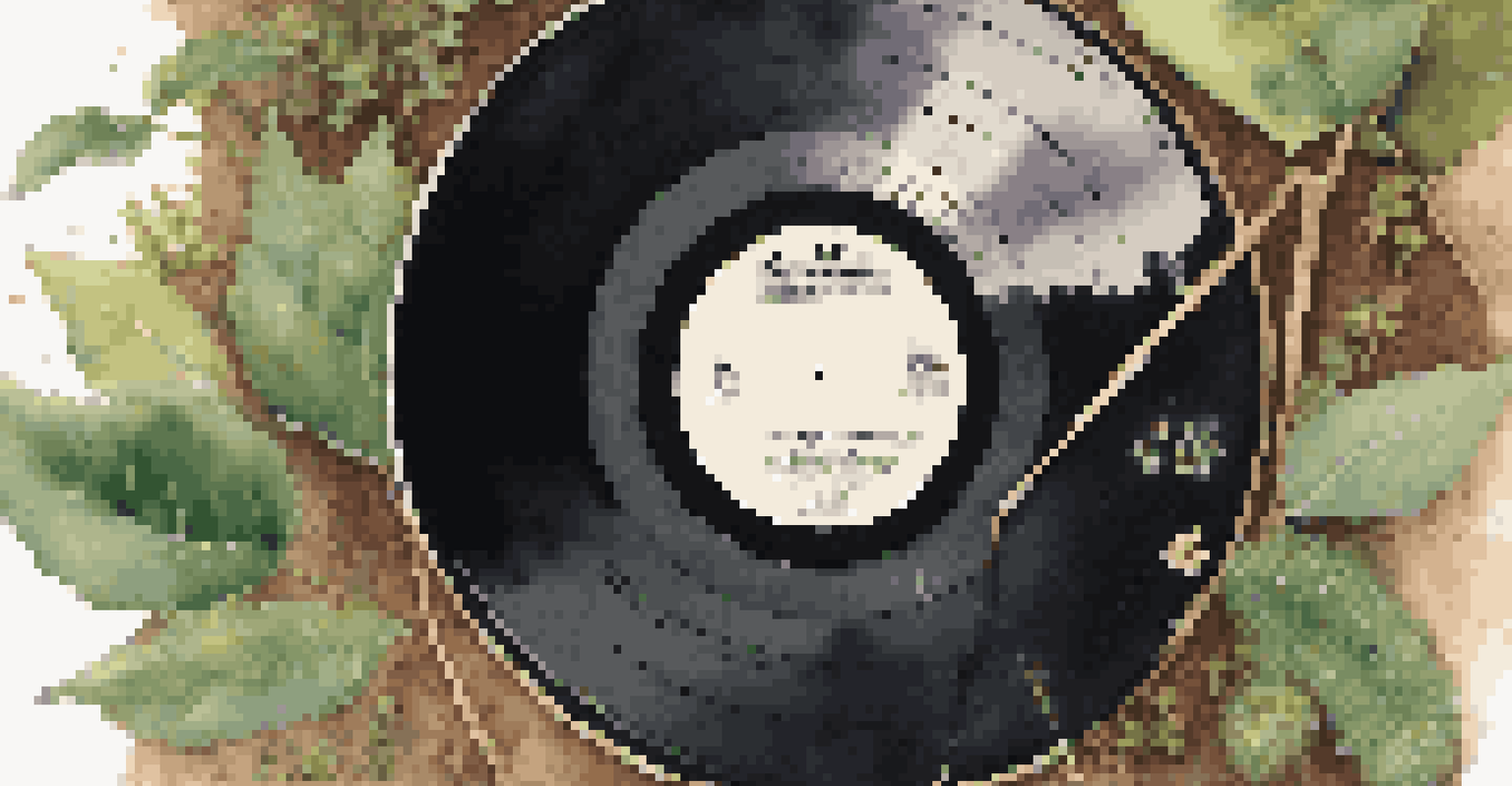Sustainable Practices in Music Journalism and Media

Understanding Sustainability in Music Journalism
Sustainability in music journalism refers to practices that minimize environmental impact while promoting social responsibility. This concept has gained traction as more writers and outlets recognize their role in shaping cultural narratives. By prioritizing sustainability, music journalists can influence both artists and audiences to adopt eco-friendly practices in their work and consumption.
Sustainability is not a destination, but a journey that requires continuous improvement.
An essential aspect of sustainability is the idea of longevity. Rather than focusing on fleeting trends, journalists can highlight artists and initiatives that prioritize sustainable practices, encouraging a culture of responsibility within the music industry. This approach not only benefits the environment but also fosters a deeper connection between artists and their audiences.
Moreover, sustainable journalism can drive meaningful conversations about the challenges created by climate change and social injustices. By addressing these topics, music writers can inspire their readers to reflect on their choices in music consumption and support initiatives that prioritize sustainability.
Eco-Friendly Practices in Music Events
Music events, from festivals to concerts, significantly impact the environment. Sustainable practices in event planning can include reducing waste, utilizing renewable energy sources, and opting for eco-friendly venues. For instance, several festivals have adopted measures like composting, recycling, and offering digital tickets to lower their carbon footprint.

Moreover, artists can play a pivotal role in promoting sustainability during their performances. Some musicians have begun to incorporate messages about environmental awareness into their shows, encouraging fans to consider their own impact. This not only raises awareness but also creates a community of like-minded individuals who champion sustainability.
Promoting Eco-Friendly Practices
Music journalists can influence the industry by highlighting sustainable practices in events and supporting eco-conscious artists.
As music journalists, covering these eco-friendly practices can amplify their importance and encourage both artists and audiences to embrace similar initiatives. By spotlighting sustainable events, journalists can influence the industry to consider the environmental impact of their activities.
Digital Media: A Green Alternative
With the rise of digital media, music journalism has undergone a significant transformation. Online platforms often have a lower environmental impact than traditional print media, reducing paper waste and transportation emissions. This shift allows writers to reach global audiences without the heavy carbon footprint associated with physical distribution.
The future will be green, or not at all.
However, digital media isn't without its own challenges, such as energy consumption from data centers. Music journalists can address these issues by advocating for green hosting solutions and encouraging their audiences to support environmentally responsible platforms. This approach not only promotes sustainability but also helps readers make informed choices about where they consume their media.
By emphasizing the benefits of digital media, journalists can encourage a broader acceptance of online platforms while still raising awareness about the environmental implications of their use. This balance is crucial in fostering a sustainable future for music journalism.
Highlighting Sustainable Artists and Labels
One effective way to promote sustainability in music journalism is by featuring artists and labels that prioritize eco-friendly practices. Many musicians are passionate about environmental issues and incorporate them into their music, making it easier for journalists to connect these themes with their audiences. By shining a light on these artists, journalists can inspire fans to support sustainable music.
For example, some labels are making strides in reducing their carbon footprint by implementing green production methods and using sustainable materials for merchandise. By highlighting these initiatives, music journalists can help create a culture that values environmental responsibility within the industry.
Digital Media's Environmental Impact
The shift to digital platforms allows music journalism to reduce its carbon footprint, but it also requires a focus on energy-efficient solutions.
Furthermore, interviews and profiles of these sustainable artists can serve as powerful narratives that resonate with readers. These stories can motivate others in the industry to adopt similar practices, creating a ripple effect that fosters a more sustainable music culture.
The Role of Social Media in Sustainability
Social media platforms have become vital tools for music journalists to promote sustainability. They provide a space to share information about eco-friendly initiatives, connect with sustainable artists, and engage audiences in meaningful conversations. By leveraging these platforms, journalists can amplify their message and reach a wider audience.
Additionally, social media allows for real-time interactions, making it easier for audiences to participate in sustainability discussions. Journalists can encourage followers to share their own experiences and practices, fostering a sense of community around sustainability. This engagement can lead to greater awareness and action within the music community.
However, it’s essential for journalists to approach social media with authenticity. By sharing genuine stories and insights about sustainability, they can build trust with their audience and inspire them to take actionable steps toward a greener future.
Challenges in Sustainable Music Journalism
While the push for sustainability in music journalism is encouraging, there are challenges that writers face. One significant hurdle is the industry’s entrenched practices, which can be resistant to change. Journalists may encounter pushback when advocating for eco-friendly initiatives, particularly from traditionalists who prioritize profits over sustainability.
Moreover, the rapid pace of the digital landscape can make it difficult to maintain a consistent focus on sustainability. Journalists often feel pressured to cover trending topics or big-name artists, which may overshadow the important narratives surrounding eco-friendly practices. This can lead to a lack of coverage for sustainable initiatives that deserve attention.
Challenges in Sustainable Journalism
Despite the growing focus on sustainability, journalists face resistance from traditional industry practices and the pressure of trending topics.
Despite these challenges, music journalists have the opportunity to advocate for change. By prioritizing sustainability in their writing and staying committed to the cause, they can help shift the industry's focus and inspire others to follow suit.
Future Directions for Sustainable Music Journalism
As the conversation around sustainability continues to grow, the future of music journalism is likely to evolve alongside it. Journalists can play a crucial role in shaping this future by staying informed about emerging sustainable practices and technologies. This knowledge will allow them to create content that not only informs but also inspires action within the music community.
Moreover, collaborations between journalists, artists, and industry leaders can drive innovative solutions and foster a collective commitment to sustainability. By working together, these stakeholders can amplify their impact and create a more sustainable music industry. This collaboration can take the form of joint campaigns, events, or community initiatives.

Ultimately, the future of sustainable music journalism hinges on a shared vision of responsibility and accountability. As more journalists embrace this mission, they will contribute to a more sustainable culture that values both music and the planet.